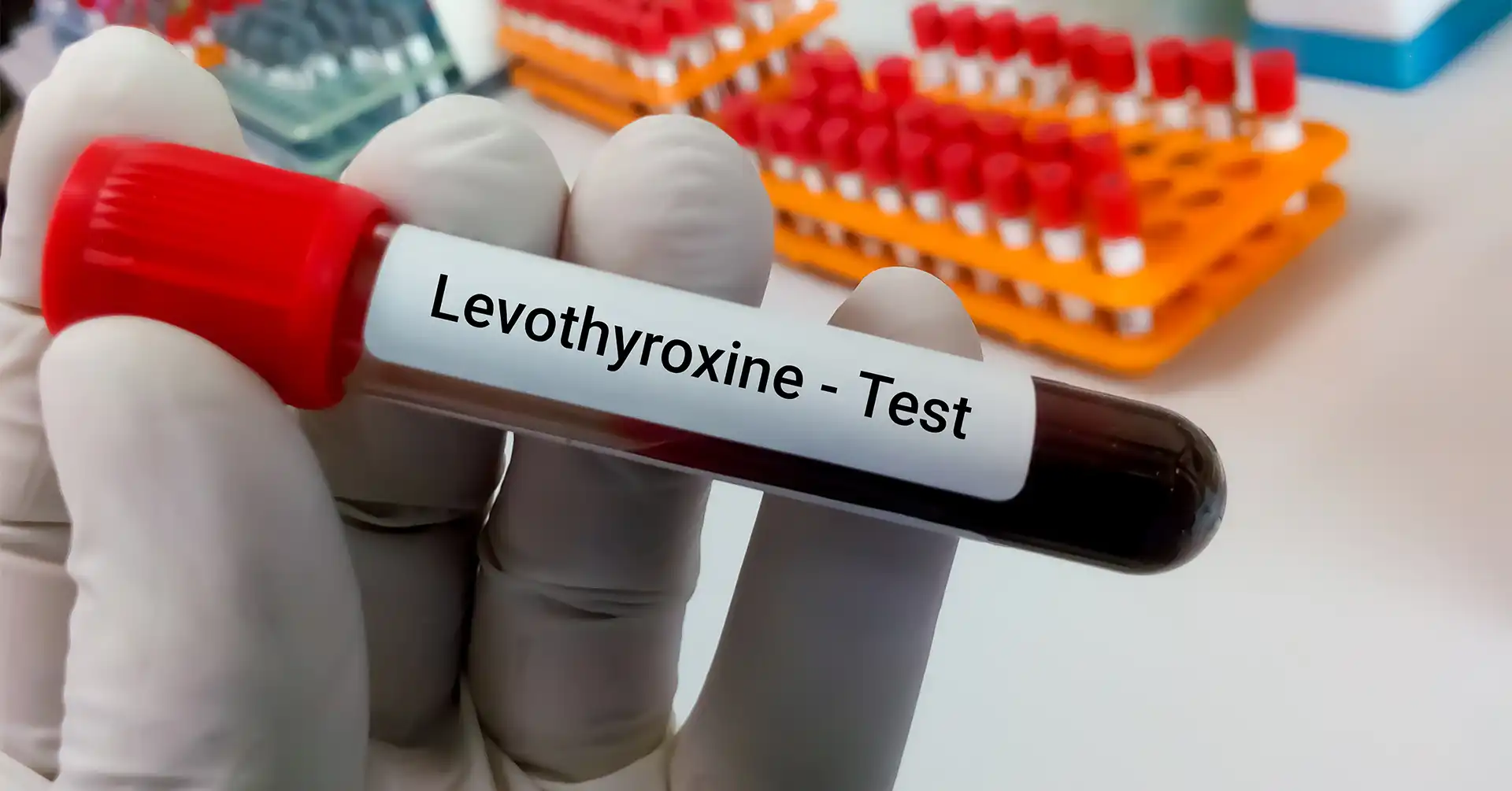In thyroid medications, levothyroxine is a cornerstone in treating hypothyroidism. However, navigating its usage requires a deep understanding of its benefits and potential pitfalls. This article delves into the world of Levothyroxine, shedding light on its effects and offering essential insights for making well-informed decisions about its usage.
From uncovering its positive impacts on stabilizing thyroid hormone levels to exploring the nuances of levothyroxine side effects, we embark on a journey to empower readers with comprehensive knowledge.
By understanding the risks and consulting healthcare providers for personalized guidance, individuals can confidently navigate the complexities of levothyroxine usage, ensuring their health decisions are grounded in awareness and expertise.
What is Levothyroxine?
Levothyroxine is a medication primarily prescribed for hypothyroidism, in which the thyroid gland doesn’t produce enough hormones. It contains synthetic thyroid hormones that help regulate the body’s energy and metabolism.
Why and How it’s Used in Treating Hypothyroidism
Levothyroxine is essential for individuals with hypothyroidism as it replaces the lack of thyroid hormones, alleviating symptoms like fatigue, weight gain, and sensitivity to colds. It works by supplementing thyroxine, a hormone naturally produced by the thyroid. Regular use helps stabilize blood sugar levels and improves temperature regulation in the body.
Different Types and Brands of Levothyroxine
Various FDA-approved brands of levothyroxine, such as Synthroid, Levothroid, Levoxyl, Tirosint, and Unithroid, offer similar benefits. Different dosages are available, tailored to individual needs. Understanding the diverse brands allows healthcare providers to choose the most suitable option for patients, considering dosage, tolerance, and specific health conditions.
Levothyroxine Side Effects: Ensuring Safe Usage
While levothyroxine is vital for hypothyroidism, it’s crucial to be aware of potential side effects. Understanding the medication and its variations helps patients and healthcare providers make informed decisions, ensuring safe and effective treatment. Regular consultations and open communication about levothyroxine side effects are essential for managing hypothyroidism effectively.
Common Side Effects of Levothyroxine
Physical and Emotional Changes
Levothyroxine side effects can manifest in various ways, with physical and emotional changes among the most common. Physically, individuals may experience fluctuations in weight, which can involve either weight gain or weight loss. Additionally, you might notice headaches, nausea, diarrhea, and persistent fatigue. Changes in appetite and excessive sweating are also possible side effects to be aware of. Emotionally, Levothyroxine can influence mood and energy levels, potentially causing mood swings or alterations in emotional well-being.
Impact on Menstrual Cycle
For females, the impact of levothyroxine on the menstrual cycle is a noteworthy consideration. It can lead to changes in the regularity and intensity of menstrual periods. Some individuals may observe irregular periods, while others may experience heavier or lighter flow during menstruation. These menstrual changes can be attributed to the influence of levothyroxine on hormone levels in the body, and they are important to discuss with a healthcare provider.
Autoimmune Problems
Individuals taking Levothyroxine may sometimes experience autoimmune issues as side effects. Their immune system may react adversely to the medication, leading to various symptoms and potential health concerns. Be vigilant for signs of autoimmune problems, such as skin rashes, hives, or other allergic reactions. If you suspect an autoimmune reaction to Levothyroxine, seeking immediate medical attention to address these concerns and exploring alternative treatment options is crucial.
Serious Side Effects and Overdose Symptoms
Levothyroxine side effects can sometimes be serious, and you must be aware of them for your well-being.
Recognizing Serious Reactions
Serious reactions to levothyroxine may include symptoms such as vomiting, blurred vision, dizziness, eye pain, pain in your hip or knee, irregular heartbeat, palpitations, arrhythmias, tremors, swelling, hives, skin rash, severe fatigue, severe headache, and abnormal physical growth in children. If you experience any of these symptoms, taking them seriously and seeking prompt medical attention is crucial.
Symptoms of Levothyroxine Overdose
An overdose of Levothyroxine can lead to symptoms like an irregular heart rate, uncontrollable shaking of any part of the body, sudden unconsciousness, a sudden cold feeling, lightheadedness, abrupt slurring of speech, and confusion. If you suspect an overdose or experience these symptoms, acting quickly and getting medical help is vital.
Immediate Medical Care for Overdose
In case of a suspected Levothyroxine overdose, seeking immediate medical care is essential. Overdosing on this medication can be dangerous, and professional medical assistance is crucial to address the situation effectively and ensure your safety. Don’t hesitate to ask for help if you have concerns about a possible overdose.
Levothyroxine Interactions: Medications and Supplements
Common Drug Interactions with Levothyroxine
When taking levothyroxine, being aware of potential interactions with other medications is crucial. Some drugs may interfere with the effectiveness of levothyroxine or amplify its side effects. Always inform your healthcare provider about all the medicines you are taking, including over-the-counter drugs, to prevent complications related to Levothyroxine side effects.
Impact of Herbal Supplements on Levothyroxine
Herbal supplements, although natural, can also influence how levothyroxine works in your body. Some herbs might affect thyroid function or the absorption of the medication, leading to unpredictable Levothyroxine side effects. Discuss any herbal supplements you plan to take with your healthcare provider to ensure they won’t interfere with your thyroid medication.
Foods and Substances to Avoid to Minimize Levothyroxine Side Effects
Certain foods and substances can interact with levothyroxine, affecting its absorption and efficacy. It’s essential to avoid specific foods, such as soybean products, and substances like high-fiber supplements that might hinder the proper functioning of the medication. By understanding and adhering to these dietary restrictions, you can minimize Levothyroxine side effects and ensure the medication effectively manages your condition.
Optimizing Levothyroxine Use
Proper Dosage and Timing
To optimize levothyroxine use, it’s crucial to follow your healthcare provider’s recommended dosage and timing instructions precisely. Take the medication as prescribed, usually on an empty stomach, about an hour before eating. This ensures maximum absorption and effectiveness, minimizing the risk of levothyroxine side effects.
Adjustments Based on Diagnosis and Health Factors
Regular communication with your healthcare provider is essential. They will assess your progress and adjust the dosage based on your specific diagnosis and health factors. Weight, age, and overall health can influence the appropriate dosage. By staying in touch with your provider, you can ensure that your Levothyroxine treatment is tailored to your unique needs, reducing the likelihood of adverse side effects.
Handling Missed Doses
Consistency is key when taking levothyroxine. If you accidentally miss a dose, take it as soon as you remember. However, if it’s almost time for your next dose, skip the missed one and continue with your regular schedule. Do not double up on doses. Always consult your healthcare provider if you have concerns about missed doses to maintain a stable thyroid hormone level and minimize the risk of experiencing unexpected levothyroxine side effects.
Long-Term Effects and Risks of Levothyroxine
Potential Side Effects Over Time
Levothyroxine side effects can manifest differently as you use the medication over the long term. While it helps manage hypothyroidism, there might be gradual changes in your body. Watch for subtle shifts like weight fluctuations, heat sensitivity, joint discomfort, and menstrual cycle alterations. It’s essential to recognize these changes to address them effectively.
Risks Associated with Prolonged Use
Understanding levothyroxine side Effects becomes crucial when considering prolonged use. Continuous usage may lead to decreased bone mineral density and potentially autoimmune dysfunction. Moreover, a study highlighted a higher cancer risk in long-term users. Awareness of these risks empowers you to make informed decisions about your health, allowing you and your healthcare provider to weigh the benefits against potential concerns.
Consideration of Alternative Treatments
Given the concerns associated with levothyroxine side effects, exploring alternative treatments becomes significant. Consult your healthcare provider to discuss options beyond standard medication. Compounded synthetic thyroid hormones or other personalized solutions offer a more suitable approach, aligning with your health needs and minimizing potential risks. Stay proactive in exploring these alternatives to ensure your well-being.
Conclusion
Understanding levothyroxine’s potential risks and benefits is crucial for making informed decisions about your health. Recognizing the positive effects, such as stabilizing thyroid hormone levels, needs to be balanced with awareness of the possible side effects. Being well-informed empowers you to make choices aligned with your well-being.
Consulting Healthcare Providers for Personalized Guidance
When it comes to managing your health, consulting healthcare providers is vital. They can provide personalized guidance tailored to your specific needs and concerns. Discussing levothyroxine’s side effects with your healthcare provider allows you to address any worries or uncertainties. Their expertise ensures that your treatment plan aligns with your overall health goals, promoting confidence and peace of mind in your medical decisions.
Read More:
Healthcare Marketing and 7Ps- A Brief Overview
Ketamine Therapy: The Remedy to A Happy Mental Health
NAD+ IV Vitamin Therapy: Innovative Approach to Wellness






